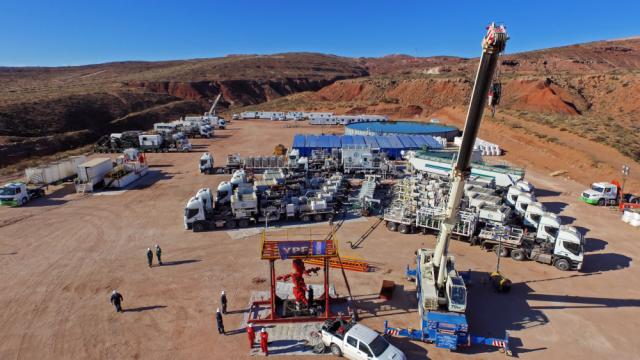
Despite headwinds, U.S. investors will remain interested in Argentina due to its massive shale accumulations in the Vaca Muerta Shale. Pictured, YPF Vaca Muerta Shale oil extraction in 2015. (Source: Sobrevolando Patagonia / Shutterstock.com)
Some Latin American national oil companies (NOCs) should benefit from higher commodity prices globally over the medium- to long-term, but not all, according to Goldman Sachs.
“Brazil’s Petrobras and Colombia’s Ecopetrol have shown meaningful earnings leverage to oil price increases over the past couple of years while Argentina’s YPF has not,” analysts with Goldman Sachs wrote July 14 in a research note to clients.
Petrobras, Ecopetrol and YPF are the largest and most important NOCs in the South American region and combined provide the global oil market with significant oil quantities ranging from light and medium to heavy.
The Goldman Sachs analysts recognized “a high degree of uncertainty around demand which should keep volatility high at the commodities level in the short term and… could translate into high volatility to the Latin American equities as well,” highlighting risks related to the recent election in Colombia and the upcoming election in Brazil.

Bolsonaro’s Rage
Petrobras is the largest oil producer and exporter in Latin America and holds tremendous production upside due to continued developments in the prolific presalt region offshore. However, the company’s ongoing refinery divestments will see it focus less capital on downstream activities and more in the upstream.
The tight global supply of diesel could bring supply risk to Brazil, a net importer, Goldman Sachs wrote. The risk is high since U.S. diesel exports represented approximately 50% to 80% of Brazil’s diesel imports during 2019-2021, São Paulo-based analyst Bruno Amorim wrote in the note citing data from Brazil’s oil regulator ANP.
Constant changes within Petrobras at the CEO level have become common under Brazil’s far-right President Jair Bolsonaro as part of his efforts to limit fuel price increases ahead of a reelection bid on Oct. 2.
RELATED:
Petrobras Board Names Andrade as New CEO
Brazil’s presidential election will most likely present a showdown between Bolsonaro and former Brazilian President Luiz Inácio Lula da Silva representing the left. Voters will likely gravitate to the candidate they believe will best tackle economic issues including fuel prices and inflation. Bolsonaro’s poor handling of the COVID-19 pandemic is also likely to influence many voters.
Petro Uncertainties
The recent presidential election in Colombia has similarly increased uncertainties in the Andean country and for Ecopetrol related to potential changes in fuel pricing policies, Goldman Sachs said.

The recent Colombian election poses “some risk on the forward [on uncertainty around fuels pricing policy],” the investment company said.
The uncertainties in Colombia relate to president-elect Petro Gustavo and his aim to transition the country away from fossil fuels like oil and coal to cleaner renewable sources.
Comments from recently appointed Environmental Minister Susana Muhamad point to Petro’s administration ending fracking and Colombia’s potential to significantly boost oil and gas supplies. Down the road, such a move could force Colombia and Ecopetrol to look outward for supplies if renewables can’t quickly fill the void currently plugged by fossil fuels.
RELATED:
Colombia’s Presidential Election Creates Uncertainties for US Oil Sector
Argentine Headwinds
Argentina’s YPF, a relatively small oil producer and exporter, hasn’t shown leverage to oil price increases in recent years, according to Goldman Sachs. The firm added that the tight diesel supply global could still impact Argentina, which is also a net importer.
YPF confronts political headwinds around the direction of Argentina’s oil and gas sectors including efforts to expand shale production and exports as well as fuel subsidies. Internally, YPF continues to struggle to reduce its long-term debt amid an unfavorable economic backdrop that includes inflationary and exchange rate volatilities.
Still, U.S. investors will remain interested in Argentina due to its massive shale accumulations. The South American country is home to technically recoverable shale gas resources of 802 Tcf of gas, the world’s second largest accumulation after China and 27 billion barrels of oil, the world’s fourth largest, according to the U.S. Energy Information Administration data published in a 2013 study.
Recommended Reading
Elk Range Royalties Makes Entry in Appalachia with Three-state Deal
2024-03-28 - NGP-backed Elk Range Royalties signed its first deal for mineral and royalty interests in Appalachia, including locations in Pennsylvania, Ohio and West Virginia.
Marketed: EnCore Permian Holdings 17 Asset Packages
2024-03-05 - EnCore Permian Holdings LP has retained EnergyNet for the sale of 17 asset packages available on EnergyNet's platform.
GeoPark to Acquire Interests in Vaca Muerta
2024-04-11 - GeoPark Ltd. entered into a binding offer to acquire a non-operated working interest in Argentina’s Neuquen Basin’s Vaca Muerta Formation as it extends its reach across Latin America.
EIA: E&P Dealmaking Activity Soars to $234 Billion in ‘23
2024-03-19 - Oil and gas E&Ps spent a collective $234 billion on corporate M&A and asset acquisitions in 2023, the most in more than a decade, the U.S. Energy Information Administration reported.
Diamondback Prices Senior Notes to Help Cover Endeavor Deal Cost
2024-04-10 - Diamondback Energy’s notes will help cover cash consideration for the pending acquisition of Endeavor Energy as well as repaying debt owed by Endeavor.





